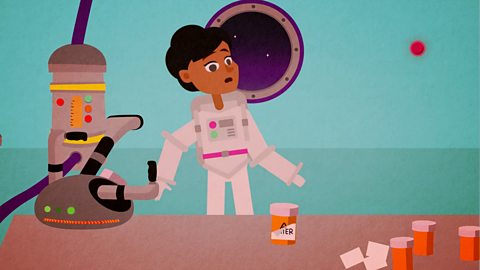Ellipsis…
An ellipsis is three dots used when leaving out a word or a phrase.
Three dots: no more, no less and there are different ways to use it.
‘The space station has a cracked window… dangerous.’
Notice I didn’t have to say ‘The space station has a cracked window. This is a very dangerous situation.’
You could understand even without the whole of the second sentence. This is an example of ellipsis. It means the reader can mentally finish the sentence with the obvious conclusion.
There’s also another use for ellipsis: when you finish a sentence in your head.
So when Selena Stardust asks Space Cadet Carl if he fixed the crack in the window, he replies, “Well, I was going to…”
Selena immediately understands that “but I didn’t” goes without saying.
She’s finishing the sentence in her head.
Hold on, Carl. Sometimes an ellipsis can also represent a suspension point or a hesitation. ‘Luckily for Carl, Salena is on the ball.
What a hero…’ Selena is. But you knew that last part, didn’t you? That’s ellipsis.
Okay, so we’ve cracked it.
An ellipsis is three dots used when leaving out a word or a phrase.
Three dots: no more, no less and there are different ways to use it.
Good work, Selena. Once again, you have saved the day, for now…
Video summary
Part of a series of animated films following a cast of characters’ adventures and mishaps as they get to grips with grammatical terms.
In this film, Space Cadet Carl should have paid more attention while cracking the meaning of the ellipsis.
Teacher Notes
Explore how to use ellipses as part of a range of techniques to build suspense, anticipation and mystery in students’ own writing.
Analyse appropriate text and comment on the use of ellipses.
This clip is suitable for teaching English at Key Stage 3 or Third Level.
Antonyms and Synonyms. video
Mr and Mrs Selfie get to grips with antonyms and synonyms.

Sentences, Phrases and Clauses. video
Space Cadet Carl and Selena Stardust get to grips with sentences, phrases and clauses.

Adjectives. video
Big Dave gets to grips with adjectives.
